- Home
- Anthony Ryan
The Wolf's Call Page 3
The Wolf's Call Read online
Page 3
My brother’s name, I whispered inwardly as the black veil descended. What is it?
The veil duly parted and I found myself standing atop a low rise, tall grass whispering in an evening breeze. The sky had the darkened hues of twilight and I could see many fires burning in the shallow depression below. An army, I realised, taking in the sight of the veritable city of tents clustered around campfires where men sat or stood. Their armour and weapons were stacked, the design very different to the black iron breastplates and chain mail of the Hast. These consisted of the overlapping steel plates and curve bladed spears of soldiers in service to the Merchant Kings. It was the largest host I had ever seen, thousands upon thousands strong.
“Who are you?”
I started at the sound of another voice. The woman stood a dozen paces away, her appearance greatly surprising in its sheer unfamiliarity. Her garb, a simple ankle-length robe of black featuring a small white flame sigil on the breast, was not one I had seen before. Also, her features were different in shape and colouring to the people of the Merchant Realms, more like the Stahlhast with their blue eyes and pale skin. But what surprised me most, in fact shocked me, was that she was looking directly at me. She saw me.
“Who are you?” she repeated, gaping at her surroundings with wide and fearful eyes. “Where am I?”
I could only stare, dumbfounded. Never once during any previous True Dream had any of its denizens taken note of my presence. How could they? I wasn’t actually here.
“Did you call me to this place?” the woman demanded, advancing towards me, suddenly angry rather than baffled. I failed to move, still caught in a snare of uncertainty and also distracted by the fact that the black-robed woman wore no shoes. Her feet were black with accumulated filth, and for some reason I found the sight oddly fascinating.
“This is not a vision from the Father,” the woman said, lunging towards me. “It feels different. I can tell!”
My preoccupation with her feet, coupled with a consuming sense of utter surprise, forestalled any reaction as she actually took hold of my arms, her grip fierce. I remember noting the bloodshot condition of her eyes as her face came within inches of mine. It was a comely face, in truth, possessed of a smoothness that spoke of a woman somewhere shy of her thirtieth year. But it was crowned by an unruly mass of dark, unkempt hair, and her breath had a familiar acrid tinge that, coupled with her reddened eyes, provoked a singular deduction. A drunkard. My dream has been invaded by a drunkard with dirty feet.
“Do not try to fool me, witch!” she hissed. “What Dark design is this?”
It was the thin but pungent stream of her breath that roused me, twisting my features into a disgusted mask as I snapped my head forward, slamming my forehead against her nose. The desired effect was immediate, her hands slipping from my shoulders as she sank to her knees, groaning.
“You asked who I am,” I said, drawing the long-knife from my belt and putting it to her neck. “I would know your name first.”
I was gratified to see the edge of the blade press into her flesh. If we could touch each other here, it appeared we could damage each other too.
“I’ll tell you nothing, servant of the Dark,” she said, face tensed by pain as she stared up in defiance. “I will never betray the Father’s love . . .”
She let out a pained squeak as I whipped the blade across her cheek, leaving a small but deep cut. “How do you come to be here?” I demanded. “How can you see me? How did you find your way into my dream?”
Her pain and animosity faded for a moment and she gaped up at me in baffled wonder. “You mean . . . you too are a seer? But . . . you cannot know the Father’s love. He would not bestow so great a gift upon one such as you . . .”
“What father?” I demanded, angling the tip of my blade so that it hovered an inch from her eye. “What are you gabbling about?”
The sound of many horns swallowed my words, the pealing echo rising up from the army below in a great chorus of alarm. I raised my gaze from the drunken woman to see the army responding to the call. Soldiers ran to retrieve stacked spears and don armour, crossbowmen gathered their quivers and cavalrymen hauled saddles to tethered horses.
“What’s happening?” the woman asked. I realised I still had my knife poised to skewer her eye and stepped away, suddenly feeling somewhat foolish.
“A battle, apparently,” I replied, sheathing my blade.
“Where?” She got to her feet, wincing and rubbing at her nose. I saw that the bruise was now fading, as was the cut on her cheek. It seemed any wounds we inflicted here were only temporary. “Who is fighting?”
“I’m not exactly sure.” I turned away to watch the army form ranks. “I suspect we are somewhere on the southern Steppe, not far from the border with the lands of the Merchant Kings.”
“Merchant Kings?”
I turned to her, brows creasing in consternation at the genuine ignorance in her voice. How could she not have heard of the Merchant Kings? They possessed most of the wealth in the world entire. “I think it’s time we introduced ourselves properly,” I said.
She drew herself up, chin jutting at a self-important angle. “I am Lady Ivinia Morentes of the Western Marches,” she said. “Servant of the Church of the World Father, and Holy Seer by His blessing.” She paused, I assumed for dramatic effect. “Known as the Blessed Maiden to all who enjoy the Father’s love.”
I shook my head in bafflement but nevertheless raised an open hand to form the sign of peaceful greeting. “Luralyn Reyerik of the Divine Blood, daughter to the Cova Skeld of the Stahlhast.”
From the expression on her face it was clear she had no more understanding of my identity than I of hers. “You are . . .” she began with a doubtful frown, “a seer to your people?”
“Seer?”
“You see . . . things. Events that will come to pass, or have already passed.”
“Sometimes. I call it the True Dream.”
“Dream.” She let out a scornful snort, turning her attention to the mustering army. “No, girl, these are not dreams. They are gifts of insight from the Father himself. Though why he chooses to share them with you, I can’t imagine.”
Her tone made my hand itch for the knife once more but I resisted the impulse. “Where are your shoes?” I asked instead, casting a pointed glance at her blackened feet.
“Worldly comforts are a barrier to the love of the Father,” she sniffed, voice rich in pious certainty. “I shun them to live a simple and uncosseted life, as I shunned the life of wealth and indolence I was born to. Thus more easily will the Father’s insights come to me.”
I glanced at her bloodshot eyes, recalling the stink of her breath. “So you shun the comfort of shoes, but not drink.”
A twitch of anger passed over her face and her response came in clipped, defensive tones. “The church’s rituals often require wine, and the Books contain many references to its blessed properties.”
“Oh”—my voice soured with recognition—“you’re a priest.”
She straightened a little, crossing her arms, her tone betraying a bitter edge as she replied, “Women are forbidden the priesthood, by order of the Holy Reader. But I serve the church better than any man. Whilst you”—she gave me a sidelong glance, eyes narrowed in calculation—“are plainly a heretic of savage origins. Perhaps that is why He brought you here, so that I may educate you in His love . . .”
“I have a knife,” I reminded her, inclining my head at the valley. “Let’s just watch the battle, eh? I suspect that is why we’re here.”
The army had mostly formed ranks by now, long lines of infantry interspersed with companies of crossbowmen with cavalry galloping to form up on the flanks. Daylight had almost completely faded, and the scene was lit by the mingled light of the campfires and the many torches carried by mounted officers. Despite the faint echo of shouted orders, the host was eerily
quiet, covered by a pall of tense anticipation. I could sense no eagerness for battle here, only dread.
They were arrayed to face to the north, where I could see only a grassy plain stretching out into darkness. However, it wasn’t long before I felt a familiar tremble in the earth soon followed by the sonorous murmur of approaching thunder.
“You asked about my people,” I said to the woman. “You’re about to meet them.”
The thunder grew in volume, bespeaking a host of far-greater size than had ever been mustered on the Iron Steppe. I was forced to conclude that the army below was about to face the combined strength of every Skeld sworn to the Stahlhast. I must confess that, though it shames me these many years later, the prospect filled me with a keen anticipation.
So it was with some dismay that I heard the thunder suddenly diminish in volume and no Stahlhast host appeared out of the gloomy plain. I could still sense their presence, my ears detecting the mingled breath of thousands of horses and warriors. But, for whatever reason, their charge had come to a halt. Then, after a short pause, a broad line of about two hundred riders emerged into the flickering torchlight. Their horses moved at a steady walk, approaching the now fully formed ranks of the opposing army at an unhurried, even casual pace. I saw that, whilst many of the riders wore the garb of Stahlhast warriors, others were completely unarmoured and carried no weapons. Some, perhaps a third, did not appear to be Stahlhast at all, instead wearing the quilted jackets of the border folk.
This single line of mismatched riders came to a halt a few paces short of crossbow range, each regarding the assembled thousands before them with a fierce, determined concentration. I felt it then, the thrum of power I recognised from when the favoured members of the Divine Blood would make use of their gifts. Evidently, the woman felt it too.
“The Dark,” she breathed, face now riven by fear.
A loud chorus of shouts dragged my gaze back to the valley in time to see a ball of flame rising from the centre of the first rank of Merchant soldiery. I could see men rolling on the ground, enveloped by flame. Fifty paces east another stretch of infantry some twenty strong was suddenly cast backwards as if punched by some giant invisible fist, armoured bodies tumbling like dolls. More shouts sounded as the entire first rank seemed to dissolve into disparate ruin. In one place soldiers simply slumped to the ground and lay still, in another a whole company turned on itself, assailing each other in a mad frenzy of mutual destruction. Yet more flames blossomed amongst it all, and the invisible fist struck again and again.
The confusion soon spread to successive ranks, officers struggling to keep order as company after company lost their discipline in the face of mounting panic. It was then that the Stahlhast appeared. The line of mismatched riders cantered aside as a huge arrowhead formation of mounted warriors came streaking out of the gloom at full gallop. At their head was a tall figure on a jet-black stallion, a long-bladed sabre raised high in his fist. He wore an iron helm crowned by a long horsehair plume and a grated visor that concealed his features, but I knew him instantly.
The wedge of Stahlhast struck the disordered centre of the army’s line, piercing it like hot iron through softened leather, driving deep into the panicked ranks beyond. More Stahlhast charged from the plain to the east and west, each arrow of horseflesh and steel sinking deep. Within only a few heartbeats it was clear this great army was doomed, the entire valley floor a scene of slaughter. Somehow, despite the confusion and chaos of it all I had little trouble following the path of the tall rider on the black stallion. He traced a winding course across the battlefield, leaving dead and dying in his wake, his sabre moving in a constant whirl of destruction. Many are the moments now when I weep to think of my exultation then, the song of pride that rose within me at the sight of my brother’s bloody journey.
“Father!” the woman at my side cried out, sinking to her knees, tears streaming down a quivering face. “Why have you cursed me with this vision?”
“Oh, shut up,” I snapped, irritated by this distraction. “You should consider yourself privileged to witness this. For it is all as it should be. The Mestra-Skeltir will rise, and nothing will stop him. Long has it been foretold . . .”
I found my voice trailing to silence then as I watched the tall figure rein his horse to a halt. He sat regarding a group of kneeling Merchant soldiers, all with their weapons cast aside and heads bowed to the earth in a sign of utter supplication. My brother regarded them in unmoving contemplation for the space of perhaps a single heartbeat, then spurred his stallion forward, its hooves crushing the head of the nearest kneeling man as his sabre recommenced its deadly whirl.
I turned away, unwilling to watch the spectacle. The Stahlhast rarely took captives in the heat of battle, this I knew. Slaves would be harvested from the survivors in the aftermath. There was nothing unusual in my brother’s actions. But still, why did he pause? Was he enjoying their fear?
“Mercy is weakness,” I whispered, hoping the oft-spoken mantra would calm my pounding heart. “Compassion is cowardice.”
I felt the True Dream begin to dissolve then, the black veil creeping into the edges of my vision as the woman ranted on in her sorrow. “Why, Father? Why show me this triumph of a blade in service to the Dark? This portent of utter destruction? How can the holy stand against such evil?”
Then the veil closed in and she was gone, perhaps back to the wakefulness in her own land. Or perhaps she spent eternity wailing away in the True Dream. All I know is that I never saw her again, in either the dream or the waking world.
Kehlbrand waited for me outside the tent, sitting cross-legged at a fire, his shadow cast long by the rising sun. Although the dream had seemed brief, it had in fact consumed my mind for many hours. I stood shuddering for a moment, chilled by both the dawn air and the echo of the Blessed Maiden’s forlorn entreaties to her god.
“So, little colt,” Kehlbrand said, getting to his feet and moving to wrap a wolf pelt around my shivering form. “Do you have a name for me?”
“Yes,” I said, taking comfort in his smile, which had always possessed the power to banish uncertainty. “Yes, brother, I have a name.”
* * *
◆ ◆ ◆
The next day Kehlbrand presented himself to the priests, standing naked and unarmed before the altar as ritual demanded. The lesser priests duly conveyed him to the presence of the Mestra-Dirhmar, who stood waiting before the Sepulchre.
The morning had been surprisingly uneventful. Usually, the rise of a new Skeltir would stir the Skeld’s most renowned warriors to challenge, but only one stepped forward. He was a grizzled fellow named Irhnar, an aged veteran of near sixty summers and as many battles who had been mentor to both Tehlvar and Kehlbrand in their younger days.
“Why, old wolf?” Kehlbrand had asked Irhnar as he stepped forward, sabre raised at a lateral angle to indicate a formal challenge.
“It’s ill luck for a Skeltir to ascend without blood,” the old warrior said with a shrug. “And I’m tired of rising from my mats to piss six times a night. Let’s get on with it, eh, boy?”
So they had fought and Kehlbrand honoured Irhnar with a suitably bloody and prolonged death. A swift end would have been an insult, after all.
I watched Kehlbrand stand before the Mestra-Dirhmar, seeing the priest’s lips move as he asked his question. The distance was too great to detect my brother’s answer. I could see the priest’s expression clearly enough to discern a mixture of profound disappointment mingled with grim acceptance as he nodded. The True Dream, as ever, had not led me astray.
The lesser priests brought forward the dark green garb of a Skeltir and set it at Kehlbrand’s feet. Once he had clothed himself, he and the Mestra-Dirhmar made their way to the altar.
“Here stands Kehlbrand Reyerik!” the priest intoned, raising my brother’s arm. “Recognised today by the Servants of the Unseen as Skeltir of the Cova Skeld!”
A cheer rose from the Stahlhast throng, enthusiastically voiced by the Cova, whilst the other Skeld were more restrained. As the cheers continued I saw my brother turn and say something to the priest. The Mestra-Dirhmar’s features hardened and he shook his head in stern refusal. I saw then that Kehlbrand had clasped the priest’s wrist, hard enough to make him wince. As the cheering subsided Kehlbrand spoke again, and this time I heard his words: “Tell them, old man.”
The Mestra-Dirhmar gritted his teeth, humiliation and pain twisting his face into a grimace. Even then I knew this to be a crucial moment, the moment when true leadership of the Hast had been decided.
“Here stands Kehlbrand Reyerik!” the great priest repeated, teeth bared as he called out to the throng, the words coloured by the rage of a defeated man. “To be known hereafter as the Darkblade!”
CHAPTER ONE
The arrow slammed into the trunk of a pine an inch from his head. Vaelin Al Sorna stared at the fletching as it vibrated before his eyes, feeling a sting on his nose and a trickle of blood left by the shaft’s barbed head. He hadn’t heard the archer who loosed the arrow, nor had he heard the betraying creak of string and stave.
To an onlooker his reaction would have seemed swift and immediate, rolling to the right, coming to his knees, bow drawn and arrow loosed in a single smooth movement. But he knew it to be slow, even as he saw the archer, running now with his horn raised to his lips, take the shaft directly in the back and fall dead. Slow.
There was a soft rustle at his side as Ellese appeared out of the surrounding carpet of ferns, nocked bow in hand. “The camp, Uncle,” she said, slightly breathless with eagerness as she started to rise. “We need to move quickly . . .”

 Raven’s Shadow Book One: Blood Song (Raven's Shadow)
Raven’s Shadow Book One: Blood Song (Raven's Shadow)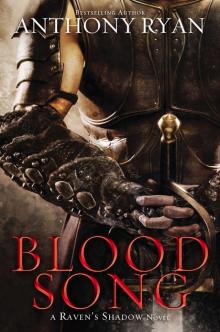 Blood Song
Blood Song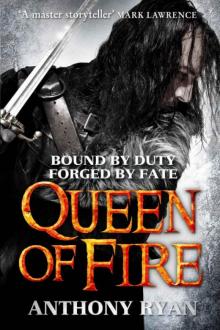 Queen of Fire
Queen of Fire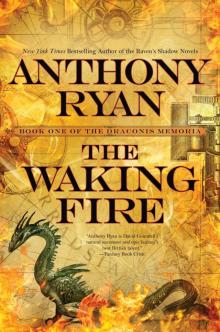 The Waking Fire
The Waking Fire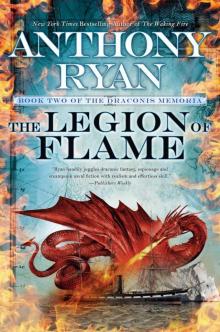 The Legion of Flame
The Legion of Flame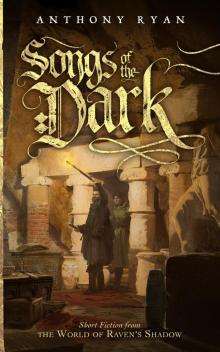 Songs of the Dark
Songs of the Dark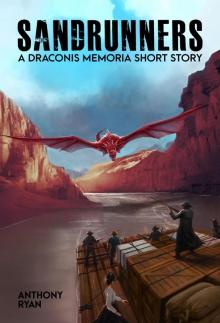 Sandrunners--A Draconis Memoria Short Story
Sandrunners--A Draconis Memoria Short Story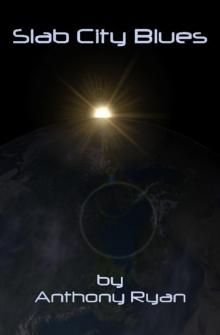 Slab City Blues
Slab City Blues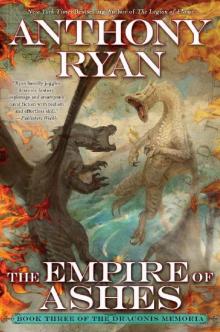 The Empire of Ashes
The Empire of Ashes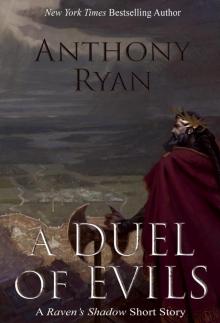 A Duel of Evils
A Duel of Evils The Pariah
The Pariah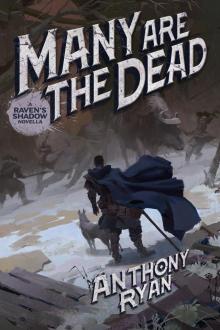 Many Are the Dead
Many Are the Dead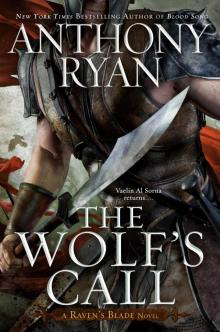 The Wolf's Call
The Wolf's Call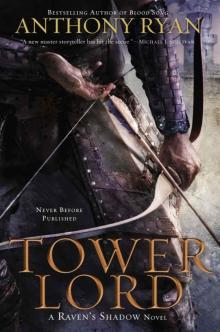 Tower Lord (A Raven's Shadow Novel)
Tower Lord (A Raven's Shadow Novel)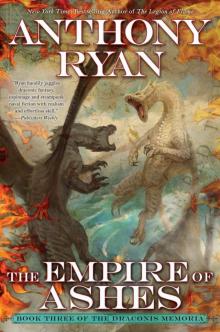 The Empire of Ashes (The Draconis Memoria)
The Empire of Ashes (The Draconis Memoria)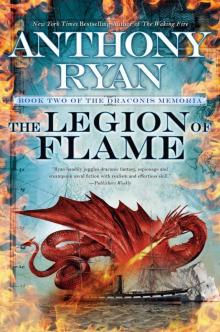 The Legion of Flame (The Draconis Memoria)
The Legion of Flame (The Draconis Memoria) Slab City Blues: A Song for Madame Choi
Slab City Blues: A Song for Madame Choi